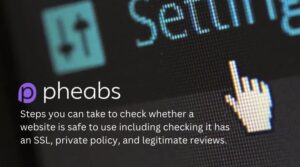From shopping to banking, we rely on websites for all kinds of tasks and even trust them with our personal information. However, not all websites are safe to use, and cybercriminals can easily trick us into sharing our personal information.
According to a recent survey, over 80% of internet users worry about their online security. However, there are several steps you can take to check whether or not a website is safe to use, including checking it has an SSL, private policy, phone number, legitimate reviews, and typos.
How Can Secure Server SSL and HTTPS:// Indicate Website Safety?
To determine if a website has a secure server SSL or HTTPS, you can check the website’s URL. If the website URL starts with “https://” instead of “http://”, it means that the website is using SSL (Secure Sockets Layer) or TLS (Transport Layer Security) encryption, which provides a secure connection between the website and your browser.
This encryption ensures that any information you send to the website, such as login credentials, credit card information, or personal data, is encrypted and protected from cybercriminals. So, if a website has an HTTPS URL, it’s generally considered safe to use. However, keep in mind that having HTTPS alone does not guarantee a website’s safety, and you should always use other methods to check a website’s security before sharing your sensitive information.
How Does Privacy Policy Help Determine if a Website is Safe to Use?
A privacy policy is a statement or document on a website that outlines how the website collects, uses, and manages the personal information of its users. The privacy policy should detail what information is collected, how it is used, who it is shared with, and how it is protected. It’s essential to check if a website has a privacy policy because it helps you understand how your personal information will be treated when you use the website.
To check if a website has a privacy policy, look for a link to “Privacy Policy” on the website’s homepage or in the footer section of the page. If the website has a privacy policy, click on the link and read the document carefully to understand how your personal information will be treated. If you cannot find a privacy policy on the website, it’s a red flag and could indicate that the website is not trustworthy. In such cases, it’s best to avoid using the website or sharing any personal information.
How Do Legitimate Reviews Affect Whether a Website is Safe to Use?
Checking the reviews of a website can help you determine whether it’s safe to use or not, but this only works if the reviews are legitimate and not fake or manipulated. Here are some tips to help you determine if the reviews seem authentic:
- Check the source of the reviews: Look for reviews on reputable websites like Google Reviews, Yelp, or Trustpilot. These websites have strict policies and procedures in place to prevent fake reviews.
- Look for patterns in the reviews: If a website has only positive reviews or a large number of negative reviews that seem to have been posted in the same day or week, it could be a sign of fake reviews. Genuine reviews usually have a mix of positive and negative feedback.
- Check the reviewer’s profile: Check the reviewer’s profile to see if they have reviewed other websites or products. If a reviewer has reviewed only one website or product, it could be a sign of a fake review.
- Look for details in the reviews: Legitimate reviews usually contain specific details about the user’s experience with the website. If a review is vague or lacks details, it could be a fake review.
- Check for grammar and spelling mistakes: Fake reviews often have grammar and spelling mistakes, while genuine reviews are usually well-written and coherent.
How Do Phone Numbers Determine Whether a Website is Safe to Use?
Recent studies have shown that 44% of website visitors will choose to leave a website if there is no contact information provided, such as a phone number or address. A website that provides a phone number is more likely to be trustworthy than a website that does not.
Check the website’s footer or header section for a “Contact Us” page. If the page exists, it will usually contain the website’s phone number. If not, the “About Us” page may also contain the website’s phone number. If it’s not listed on the page, you can usually find an email address or a contact form to get in touch with the website’s customer service.
Do Typos Indicate Whether a Website is Safe to Use?
Cybercriminals will often put together illegitimate websites in a short amount of time. This could mean that spelling errors and grammatical mistakes are likely to be made and spotted by the website users.
Further Questions to Ask and Check to See Whether a Website is Safe to Use
- Does the website have real social media channels?
- Do they have real employees on Linkedin?
- Do they promise 100% guaranteed results?
- What information are they asking for upfront?
- Are they associated with any trades or governing bodies?
- Do they ask for money or payment upfront for a simple application (not a product)?





